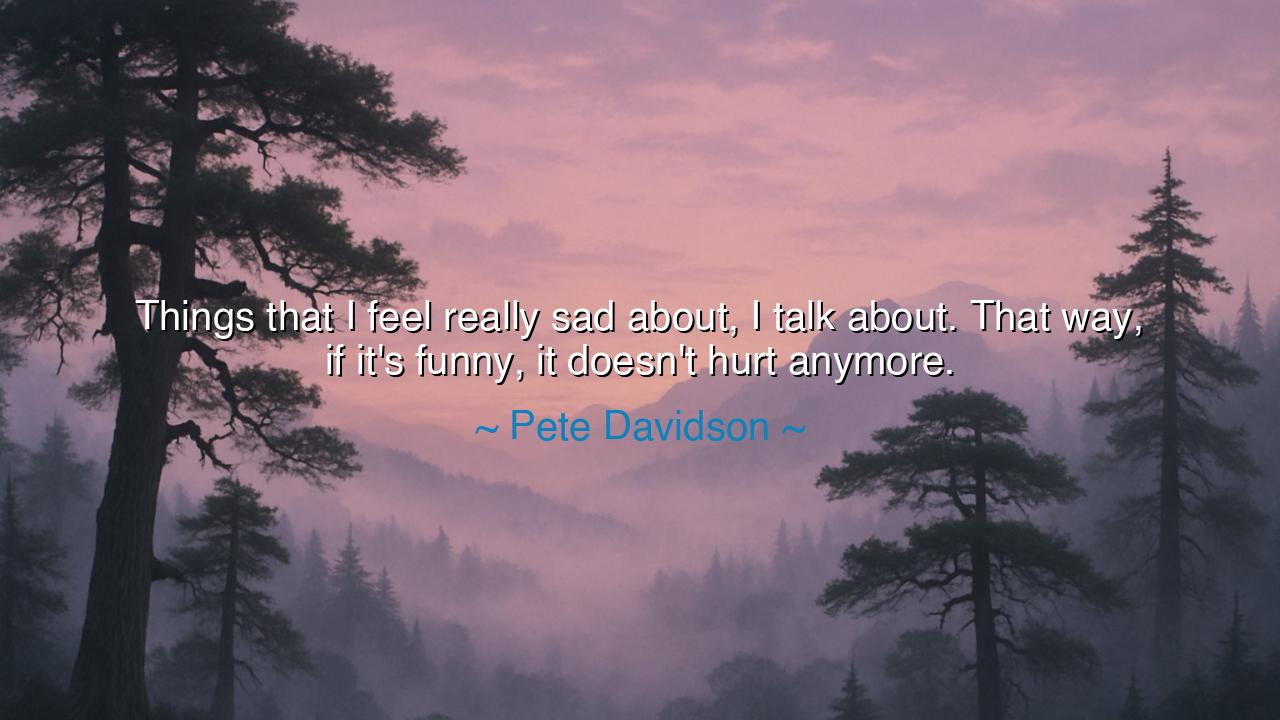
Things that I feel really sad about, I talk about. That way, if
Things that I feel really sad about, I talk about. That way, if it's funny, it doesn't hurt anymore.






“Things that I feel really sad about, I talk about. That way, if it's funny, it doesn't hurt anymore.” — thus spoke Pete Davidson, a man whose laughter is forged in the crucible of sorrow. Though born of comedy, these words carry the depth of philosophy, the kind that only those who have suffered greatly can truly understand. For in this confession lies not merely a statement about humor, but a profound revelation about healing, vulnerability, and the mysterious power of the spoken word to transform pain into peace.
Pete Davidson, known to the world as a comedian, is in truth a poet of pain. His life, marked by tragedy — the loss of his father in the attacks of September 11, and his lifelong struggle with mental illness — has given him an intimate acquaintance with grief. Yet instead of hiding his wounds, he exposes them under the light of laughter. “I talk about it,” he says — and in those words is an act of courage. For to speak one’s sadness aloud is to rob it of its secrecy. What festers in silence becomes monstrous, but what is spoken becomes human, bearable, and even, at times, funny. His art, then, is not the art of escape, but of transmutation — turning sorrow into something bright enough to live with.
This wisdom, though spoken by a modern voice, is ancient in spirit. The philosophers and storytellers of old knew that to tell one’s story is to reclaim one’s power. The Greek tragedians, such as Sophocles, wrote plays that drew laughter and tears from the same source — the shared fragility of human life. Their audiences watched kings and fools alike suffer loss, and through that recognition, their own hearts were purified. The laughter Pete Davidson seeks is of the same kind — not mockery, but release, the moment when pain loses its sting because it has been acknowledged. As the ancients might have said: what is confessed cannot control you; what is turned into art cannot destroy you.
There is a strange alchemy in laughter, one that even the wise struggle to define. It is both rebellion and acceptance. When Pete says, “if it’s funny, it doesn’t hurt anymore,” he reveals that laughter is a weapon — not of cruelty, but of defiance. To laugh at pain is to declare, “You no longer own me.” The wound remains, but it no longer rules the heart. In this, he joins a long line of souls who have fought darkness with humor — from Mark Twain, who joked his way through poverty and despair, to Victor Frankl, who found in laughter a last act of freedom even in the horror of a concentration camp. The human spirit, when it laughs, refuses to be conquered.
But Davidson’s insight also carries a gentleness. It tells us that to talk about sadness is not weakness, but wisdom. The ancients taught that confession was a form of cleansing — not in the eyes of others, but in the heart of the speaker. Silence is a heavy burden; words are wings. When sadness is spoken, it disperses into the air, and its weight lightens. And if those words draw laughter, then the healing deepens — for laughter shared among others builds bridges, turning isolation into understanding. Thus, the comedian becomes a kind of healer, using humor as a salve for both himself and his listeners.
Consider the example of Robin Williams, another artist of immense light born from darkness. Like Davidson, Williams turned his struggles with depression and pain into stories that made millions laugh. He once said, “Comedy is acting out optimism.” Through laughter, he gave others joy even as he wrestled with his own despair. Though his end was tragic, his life remains a testament to the truth Pete Davidson now carries forward — that humor is not the absence of pain, but the transformation of it. To laugh at what once broke you is to rise above it.
The lesson, then, is clear: do not bury your sorrow in silence. Speak it. Share it. Find lightness in the very places that feel unbearable. If you can find laughter within your tears, you have already begun to heal. This is not to make light of suffering, but to reclaim mastery over it. The pain you name becomes a story; the story you tell becomes strength; and the laughter that follows becomes freedom.
Thus, Pete Davidson’s words echo across generations like a timeless prayer for the broken-hearted: that in every shadow there lies a spark, waiting to become flame. Speak your grief, for silence chains the soul; laugh, even softly, for laughter loosens those chains. The ancients would call it catharsis — the cleansing fire that burns away despair and leaves behind only truth. For when you can look upon your wounds and smile, even through tears, you have done something divine: you have turned suffering into wisdom, and pain into power.






AAdministratorAdministrator
Welcome, honored guests. Please leave a comment, we will respond soon